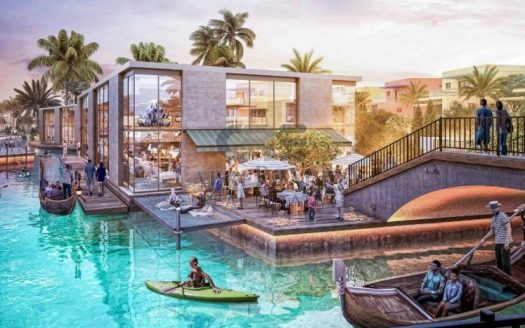Unlock Off-Plan Property Profits in Dubai Without the Guesswork
Last Updated on July 9, 2025

Investing in real estate in Dubai through off-plan properties feels like betting on a racehorse before it’s fully trained. The potential for high returns is tantalizing, but the risks—construction delays, hidden costs, or market shifts—can leave you second-guessing. Many buyers, from first-timers to seasoned investors, dive in without understanding what off-plan property entails, only to face unexpected hurdles. This article cuts through the fog, answering the top questions about off-plan investments with actionable steps. From defining the concept to navigating resale, we’ll equip you to make smart, profitable decisions.
What Off-Plan Property Really Means
The term “off-plan property” can sound like jargon, leaving buyers confused about what they’re actually signing up for. Many stumble here, unsure if it’s a solid investment or a gamble. Simply put, an off-plan property is one you buy before construction finishes, often based on architectural plans or a show unit. This section unpacks the concept to give you clarity.
In Dubai, off-plan properties are sold directly by developers, letting you secure a home or investment at a pre-construction price. These properties, typically apartments or villas, are in high-demand areas like Business Bay or Dubai Hills. You’re essentially locking in today’s price for a property that might not be ready for 2-3 years. For example, a 1-bedroom apartment in Downtown Dubai might cost $300,000 off-plan versus $400,000 when completed, per 2024 Emirates NBD data. That price gap is the allure, but it comes with strings attached.
Why does this matter? Understanding the mechanics helps you assess if off-plan fits your goals. Are you seeking long-term gains or quick flips? Off-plan leans toward the former, with developers like Emaar offering payment plans stretching over years. Emaar, founded in 1997 and partly owned by the Dubai government, is a giant in this space, known for projects like Burj Khalifa and rigorous quality controls. Knowing the developer’s track record is key to avoiding pitfalls.
Here’s a quick aside: I once met an investor who didn’t realize “off-plan” meant waiting years for completion. His frustration was palpable, but it could’ve been avoided with basic research. Check developer plans and timelines on the Dubai REST portal (dubairest.gov.ae) to start with confidence.
Weighing the Rewards of Off-Plan Investments
The promise of off-plan property lies in its potential rewards, but many buyers hesitate, unsure if the benefits outweigh the wait. Familiar situation: you’re eyeing a lower price tag but worried about tying up funds. Let’s break down why off-plan can be a smart move and how to maximize its perks.
First, off-plan properties cost less upfront. Developers offer discounts of 10-20% compared to ready homes, per 2025 Knight Frank reports. A $500,000 villa off-plan might save you $75,000 versus its completed price. Flexible payment plans, often 1-2% monthly over 3-5 years, ease the financial strain. This structure suits buyers who can’t pay cash upfront, unlike ready properties demanding full payment or hefty mortgages.
Capital appreciation is another draw. Dubai’s off-plan market saw a 35.5% transaction value surge from January to April 2025, with 60% of 2024 deals being off-plan, per Emirates NBD 2025. If you buy in a growing area like Dubai Creek Harbour, your property could gain 15% in value by completion. Plus, off-plan homes often feature modern designs—think smart home tech or eco-friendly materials—appealing to future buyers or renters.
Customization is a hidden gem. Some developers let you tweak layouts or finishes, a rare perk with ready properties. Imagine tailoring a kitchen to your taste, boosting the property’s appeal. To capitalize, research high-growth areas and secure units early. AustinContrarian’s analysts, for instance, target projects with 20%+ ROI potential, helping clients lock in prime deals.
One caveat: not all projects deliver equally. A colleague once raved about Dubai Marina’s vibe—its yacht-filled waters and bustling promenades—but noted oversupply can cap gains there. Focus on emerging hubs instead. Start by browsing developer brochures or market reports today to spot your opportunity.
Facing the Risks Head-On

Risks in off-plan property investments can chill even the boldest buyer. Stories of delayed projects or developers vanishing with funds haunt online forums. If you’ve ever worried about losing your investment, this section maps out the dangers and how to dodge them.
Construction delays top the list. In 2024, 15% of Dubai’s off-plan projects faced 6-12 month setbacks, per Colliers International. A delayed handover means longer waits for rental income or resale profits. Developer reliability is another concern. While giants like Emaar are stable, smaller firms may struggle financially, risking project stalls. Market fluctuations also loom—Dubai’s property prices dipped 5% in some areas during 2023’s global slowdown, per CBRE 2024.
Quality mismatches are less discussed but real. The glossy show unit might not match the final product, leaving buyers disappointed. To mitigate, vet developers thoroughly. Check their track record on Dubai REST or industry reports. Opt for projects with escrow accounts, mandatory in Dubai, ensuring your payments are protected until milestones are met. AustinContrarian’s due diligence process, for example, filters out 80% of risky projects for clients.
A brief detour: Dubai’s regulatory framework, overseen by the Real Estate Regulatory Agency (RERA), is a global benchmark. Unlike some markets, RERA enforces developer accountability, reducing fraud. Still, don’t skip your homework. Request project timelines and escrow details upfront to sleep easier.
The payoff? A well-chosen off-plan investment can yield 20-30% returns by completion, versus 10-15% for ready properties, per 2025 Savills data. Vet developers and monitor market trends now to minimize risks.
Counting the True Cost of Off-Plan
Hidden costs in off-plan property purchases catch many buyers off guard. You might budget for the sticker price, only to face extra fees that inflate your investment. This section lays out the full financial picture to keep your wallet intact.
Beyond the purchase price, expect a 4% DLD registration fee—$20,000 on a $500,000 property. Administrative fees, like $150-$300 for title registration, add up. Service charges, averaging $10-$20 per square foot annually, kick in post-handover. If you’re financing, mortgage arrangement fees (1-2% of the loan) and interest rates (around 4% in 2025, per Emirates NBD) apply. Off-plan payment plans spread costs, but late payments incur 1% monthly penalties.
Here’s a cost snapshot for a $500,000 off-plan apartment:
| Cost Type | Estimated Amount |
| DLD Registration Fee | $20,000 (4% of property value) |
| Admin/Title Fees | $150–$300 |
| Annual Service Charges | $10–$20 per square foot (post-handover) |
| Mortgage Fees (if applicable) | 1–2% of loan amount |
| Late Payment Penalty | 1% monthly (if payment is delayed) |
These figures, drawn from 2025 RERA guidelines, show why planning matters. To save, pay installments on time and negotiate developer discounts—some offer 5% off for early buyers. Budget for service charges early, especially in premium areas like Palm Jumeirah, where fees are steeper.
Interestingly, Dubai’s service charges fund world-class amenities. Take Dubai Hills Mall, near many off-plan projects: open 10 AM-12 AM, it offers 600+ stores, a cinema, and a rooftop park, enhancing nearby property values. Factor these costs into your plan now to avoid surprises.
Flipping Off-Plan Before Completion
Can you sell an off-plan property before it’s built? Many buyers ask this, hoping to cash out early. The process isn’t straightforward, and restrictions can trip you up. Let’s clarify how to flip profitably.
In Dubai, you can sell off-plan after paying 30-40% of the purchase price, per 2025 RERA rules, but you’ll need the developer’s No Objection Certificate (NOC). This costs $150-$500 and confirms no outstanding dues. Some developers restrict resale until 50% is paid, so check the Sales Purchase Agreement (SPA). Market demand drives profitability—off-plan resales in Dubai South yielded 10-15% gains in 2024, per Knight Frank.
Timing is critical. Selling too early limits buyers, as most prefer near-completion projects. Yet waiting too long risks market dips. To succeed, list on platforms like Property Finder, which reach 70% of Dubai’s buyers. AustinContrarian’s resale strategy, for instance, targets investors seeking quick flips, achieving 12% higher sale prices than average.
A side note: I’ve seen investors overestimate resale gains, ignoring fees like the 4% DLD transfer cost. Realistic math prevents disappointment. Review your SPA and market trends today to plan your exit.
Your Path to Off-Plan Success
Off-plan property in Dubai offers a shot at serious profits, but only if you navigate it wisely. From understanding the concept to mastering resale, each step demands preparation. Dubai’s 2025 market, with 35.5% transaction growth, rewards informed buyers with 20-30% returns, per Savills.
Don’t let complexity stop you. Start simple: research developers, check escrow accounts, or calculate costs using the table above. Every move builds toward a smarter investment, whether you’re eyeing apartments or villas. The principles—due diligence, timing, budgeting—apply universally.
Ready to dive in? Visit Dubai REST or browse developer plans this week. Your off-plan profit is closer than you think.





